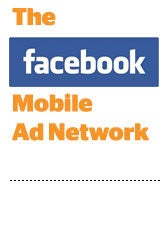 Facebook is rolling out a “small test” of mobile ads on non-Facebook sites, a spokesperson told AdExchanger today. The move is an extension of its current ad sales and serving relationship with Zynga, and the first time the company has signaled interest in combining its data with outside media impressions. Yes, it’s an ad network.
Facebook is rolling out a “small test” of mobile ads on non-Facebook sites, a spokesperson told AdExchanger today. The move is an extension of its current ad sales and serving relationship with Zynga, and the first time the company has signaled interest in combining its data with outside media impressions. Yes, it’s an ad network.
“We are going to begin showing some ads on mobile outside of Facebook,” the rep said. “We’ve been showing ads off of Facebook on Zynga for a few months, and we think showing ads on other sites outside of Facebook is another way to show people relevant ads and let them discover new apps.”
Facebook is using ad exchanges to serve the new ads. Importantly, the ads will not appear in Facebook native formats but rather IAB standard units (banners and perhaps interstitials) that will point to the iOS and Android app stores or to advertisers’ mobile websites.
But some Facebook data will be available for ad targeting. While the ads will not use social context of Facebook users (a la Sponsored Stories) they may use other Facebook data – such as demographic information, likes and interests.
The company is not disclosing advertisers, publishers, or ad exchanges it is working with on the trial mobile ad network. How ambitious is this effort? The keyword for now is clearly “small,” but scaling it quickly is certainly no problem if Facebook sees positive results, as was proven with the rapid iteration of the Facebook Exchange. “It’s a really small test right now. We’ll explore how the test goes and we’ll decide whether or not to move on with it.”
A key piece of the strategy is capturing ad dollars from app developers, a fast growing category of mobile marketer. Last month Facebook rolled out a new ad formats in its mobile experience, geared to mobile app developers.
From a financial standpoint, a mobile ad network has the advantage of boosting mobile revenues (and conveying a “mobile strategy” to investors) without compromising the user experience on its mobile properties. It still must walk a fine line with data, keeping an eye out for any user backlash against having profile information used to support ad targeting around the mobile web. “They will be targeted the same way ads on Facebook will be targeted. We will work with ad exchanges to anonymize ID,” Facebook’s rep said.













